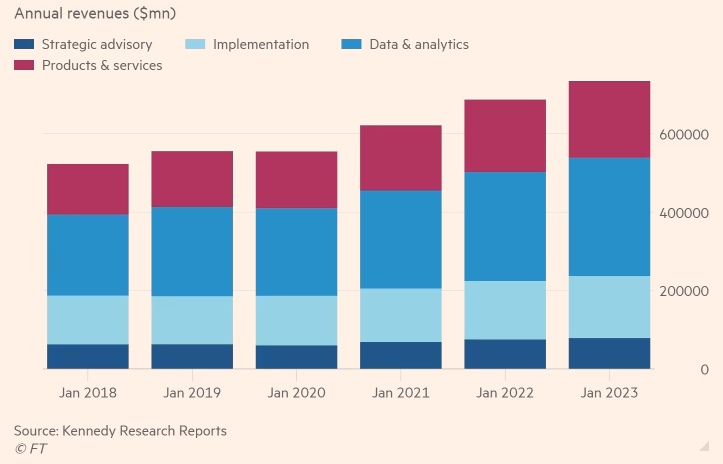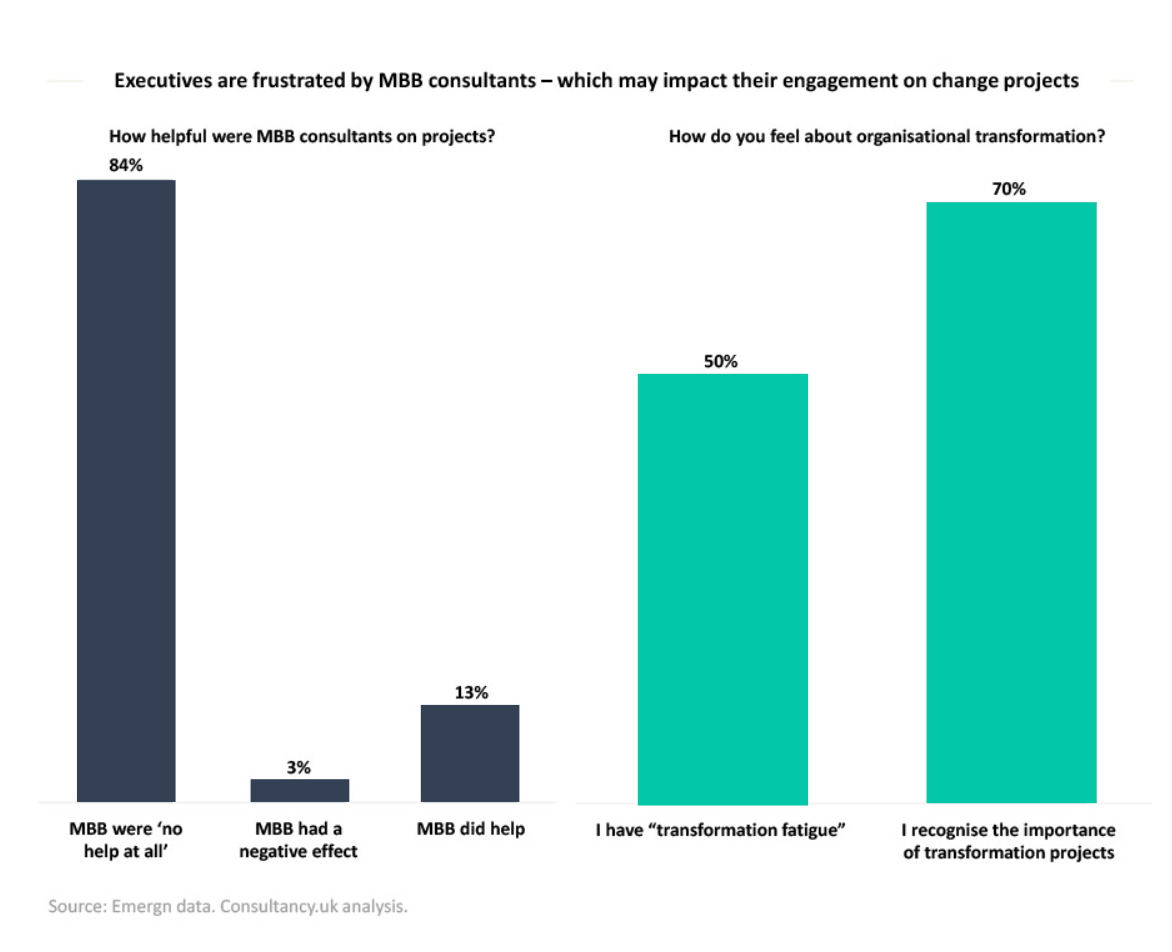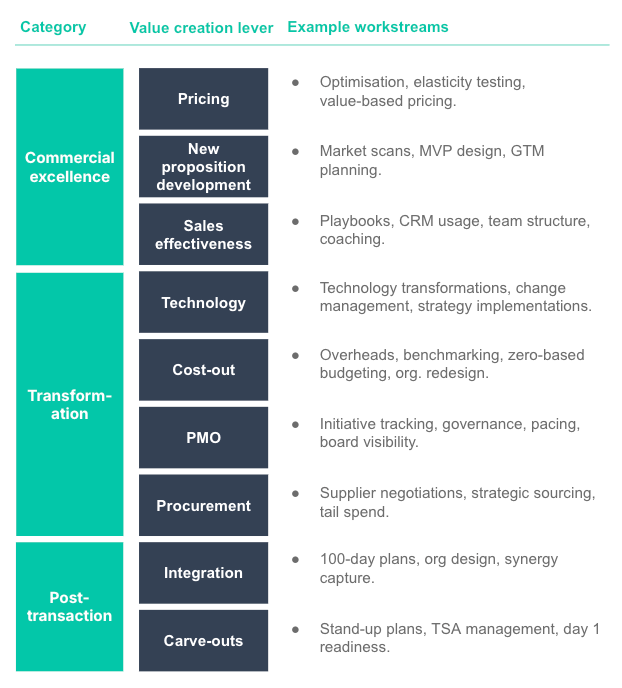The new age of consulting - how client demands are changing
Consulting disrupted: Clients demand flexibility, execution expertise, and lower fees as traditional firms face competition from interim executives and agile consulting teams.

Inhaltsverzeichniss
Schlagworte
Abonnieren Sie unseren Newsletter
Consulting is going through a seismic shift. After years of double-digit growth, the combination of a tough macro-economic climate and more alternatives in the form of independent consultants and in-house ex-consulting talent is challenging the very foundations consulting is built on.
In this article, we talk through how we’re seeing client demands for consulting and advisory support shifting, and what this means in terms of a new landscape of advisory support.
If you’d like to know any more about how you’d deploy either model, or would like to see some example projects get in touch with our team here.
Is consulting no longer recession-proof?
The old adage explains that you need consultants in the good times and the bad. As such the industry had historically been seen as largely recession-proof. This "professional services” resilience has resulted in an interest from private capital markets over the last few years, but is this being challenged in the consulting market?
Ten years ago, HBR first referenced “consulting on the cusp of disruption”. The post-COVID boom resulted in pay rises, over-hiring and an increasing reliance on non-core strategy work. This meant few in the industry were prepared for the correction in 2022-23.
We highlighted what we saw in the industry, both from a client perspective and in the consulting firms:
On the client side:
- There’s increased need for deep industry experience
- Fees have reached unsustainable levels and typical delivery models are too rigid
- Quality isn’t what it used to be
Which has started to have knock-on effects to the consulting industry:
- Top performing partners leaving to launch boutiques
- Rise of quality in the freelancer market
- Change from AI on the horizon
How is the market now responding?
The growth of consulting firms in the post-COVID era was driven by providing more advice outside of the core of strategy. Clients had found returns on bringing in expertise to help drive implementation, analytics and new products/ services. By January 2023, the Kennedy Research Reports found that strategic advisory had fallen to just 10% of the consulting industry’s revenue - from 17% just five years earlier.

The 10% of strategy work, which grew very little over the last five years, is seeing less disruption: Large Cap PE funds are still turning to McKinsey, BCG and Bain for due diligence, and development of the Value Creation Plan; the Boards of large corporates and enterprises are still choosing to get the assurance of one of these firms on the once in a decade decisions.
However, for longer-term implementation, transformation projects and new market entry projects, we’re seeing a shift away from the traditional firms. PE and Enterprise clients are conscious they don’t have the capability or capacity to deliver these in-house. They are also aware that experts who have overseen similar projects countless times will help them avoid the pitfalls and maximise ROI. However, they are unwilling to spend the fees commanded by the traditional firms - especially when the delivery models designed around strategy projects (Partner only part-time; EM+2 team) are so rarely flexible, and the Partners at these firms often don’t have real operating experience.
This has meant that very few believe MBB defend their cost when implementing large change programs - 84% of executives saying that MBB were “no help at all” in a recent Emergn survey about change projects:

A new breed of competition and the risk of marketing myopia
Theodore Levit is often quoted by consultants. They’ve explained to many clients that focusing on delivering value must always usurp the pressures of continuing to sell current products and services. Kodak and Blockbuster are often cited as examples of not doing so.
It’s definitely time the consultants heed their own advice. Consulting for many years has been able to defend its price point through exceptional solutions and effective communication of these. There’s almost a bit of magic about how they get there. However, it is fundamentally a people business. And we’re increasingly seeing clients shifting towards other ways to access these people.
Twenty years ago the consulting alumni world was still pretty small. The firms were growing but not many had been through their intense training and coaching. As they’ve continued to grow, the alumni networks and number of “consulting trained” experts has grown exponentially. We’ve seen rapid growth for two types of advice: interim experts and agile consulting teams.
Interim experts - embedded senior executives with deep operating experience
Typical roles and cost: The majority of the demand we find for interim executives are either roles responsible for overseeing a change (Chief Transformation Officers / Head of PMO) or are bringing in deep expertise (Chief Procurement Officer, Head of Pricing / Sales Excellence). The transformation roles tend to be 6-18 months in length; the experts normally 3-5 months.
Typical profiles: A combination of ex-top tier consulting (ensures they can effectively work alongside the executive team) and deep operating experience. They’ve typically worked in industry in a senior or executive role for 5-10 years. This means they know what it takes to deliver real change. Day rates will vary a lot on profile and length of project, but are typically £1.5k - £4k.
What they offer that a consulting firm can’t: There are two main drivers: time and “operating experience”. For time, interim executives are the equivalent of a “Partner” on a consulting project. Typically with Partners, they are spread between multiple projects and as such you likely only get 1-2 days of their time a week. With an interim executive, you get them 100% of the time. Secondly, they all bring deep “operating” experience. Many consulting Partners have worked their way up through consulting, without having held senior roles in PE or Industry.
Agile consulting teams: flexible, specialist, end-to-end
As part of our own consulting offering, we’re seeing client demand and ex-MBB Senior Partner supply converge across a number of specialism areas as outlined below.

Typical projects and cost: Complex decisions that need deep expertise. They are typically the main 2-3 initiatives post strategy development, and include new market entry, operational improvement, organisational design, procurement review, pricing strategy etc. They are high-impact projects that often have a big bottom-line impact. Cost varies on team composition, but typically ranges between £20-50k per week.
Typical profiles: Agile consulting firms are often led by an ex- senior Partner from McKinsey, BCG, Bain or equivalent, who leverages deep functional expertise from interims (as above).
What they offer that a consulting firm can’t: While the ex-MBB Partners ensure the same level of assurance that you’d see with one of the large consulting firms, they are able to offer much more flexible models and deeper industry / operating experience. The flexibility starts with themselves, with potential to be anywhere between 100% staffed on a project to hardly involved - and they will flex up and down the team over the project lifetime. They also offer deep industry expertise, and are able to assemble an exceptional team of interims with backgrounds spanning a plethora of consulting firms and with the requisite functional / industry operating experience.
If you’d like to know any more about how you’d deploy either model, or would like to see some example projects get in touch with our team here.
Agile consulting delivering value in practice
To expand on this with some concrete examples from our own work, we’ve summarised some key challenges we’ve recently seen from clients and outlined why the agile consulting approach worked below:
Operational improvement for a PE-backed manufacturing business
A nationwide UK manufacturer, owned by a £50bn AUM PE fund, needed rapid EBITDA uplift across its product portfolio. An agile consulting team was assembled by Movemeon Consulting to deliver impact within 2 months, with a team comprising:
- Partner: Ex-McKinsey Senior Partner with over 20 years’ experience in operational improvement and manufacturing diagnostics;
- Engagement Manager: 5 years at McKinsey, followed by senior strategy and PE-backed operational roles;
- Associate: Ex-Bain Manager with deep regulated manufacturing experience;
- Analysts: Ex-LEK and Bain, both with operating experience and strong financial modelling / PE exposure.
The challenge: Performance varied widely across sites, with underperformance dragging on overall profitability. The client needed a clear diagnostic and pragmatic turnaround roadmap, executed at speed.
The outcome: The team’s diagnostic identified 7 underperforming sites, developed tailored turnaround plans, and began embedding operational workstreams. The impact was so strong that the client permanently hired the EM from the agile team to continue the transformation.
Why agile consulting worked: This bespoke mix of ex-MBB consultants and operators, led by a senior industry expert, gave the client tier-one insight at pace and cost-efficiency, without the overhead of a traditional consulting firm.
The result: Sustainable operational improvement, delivered by a right-sized, high-calibre team.
Commercial strategy and PMI for a global consumer business
A $5bn consumer business, carved out by a $100bn+ AUM PE fund, required a new commercial strategy and seamless post-merger integration to set up the business for growth. A lean, agile consulting team was assembled to deliver across 12 months, consisting of:
- Sales Excellence & Transformation Director: 20 years’ operating experience at Expedia and Whitbread, with deep expertise in sales excellence, transformation, and commercial operations.
- Senior Consultant: Former BCG Senior Consultant with 5 years’ operating experience in high-growth tech businesses, notably having led PMI for consumer-focused businesses in 20+ countries.
The challenge: The carve-out created a need to stand up commercial functions from scratch, while simultaneously implementing a robust sales excellence strategy to accelerate performance across global markets.
The outcome: The agile team successfully established commercial functions, delivered a scalable sales excellence strategy, and ensured seamless integration across units. The impact was lasting - the client made a permanent hire of the Sales Excellence & Transformation Director to continue driving results post-project.
Why agile consulting worked: By combining a former BCG strategist with a seasoned transformation operator, the client gained a tailored, high-impact team able to deliver both strategic clarity and operational execution - faster and more effectively than a traditional consultancy.
The bottom line
Transformation isn’t just about ideas - it’s about embedding change. Strategy may set the direction, but execution decides whether the journey is completed.
Consulting firms are built around making the key and critical strategic decisions. And they are extremely effective at doing so. However, when it comes to driving the change and transformation, the operational expertise and flexibility offered by interim talent and agile consulting teams is increasingly out-competing the consultancies.
If you’d like to know any more about how you’d deploy either model, or would like to see some example projects get in touch with our team here.
Where Talent Meets Opportunity
Our exclusive network use us to find job that fit their skills, and thousands of Employers trust us to hire exceptional talent. Choose the path that matches your goals - start exploring or start hiring.
Unsere neuesten Artikel
Wir veröffentlichen regelmäßig aktuelle Artikel, um Sie über den Markt und unsere Arbeit auf dem Laufenden zu halten.

The new shape of in-house strategy and transformation teams: Lean central functions, expert flex and on-demand firepower
This article explores how in-house strategy and transformation teams are shifting from large, generalist functions to lean, senior cores supported by on-demand interim expertise.
Treten Sie unserem exklusiven globale Gemeinschaft
Erhalten Sie exklusive Daten und Einblicke zu Bezahlung, Benchmarking, und Brancheninterviews, um eine Karriere aufzubauen, die zu Ihnen passt.
Erstellen Sie noch heute ein Konto und suchen Sie nach Rollen in unter fünf Minuten.





